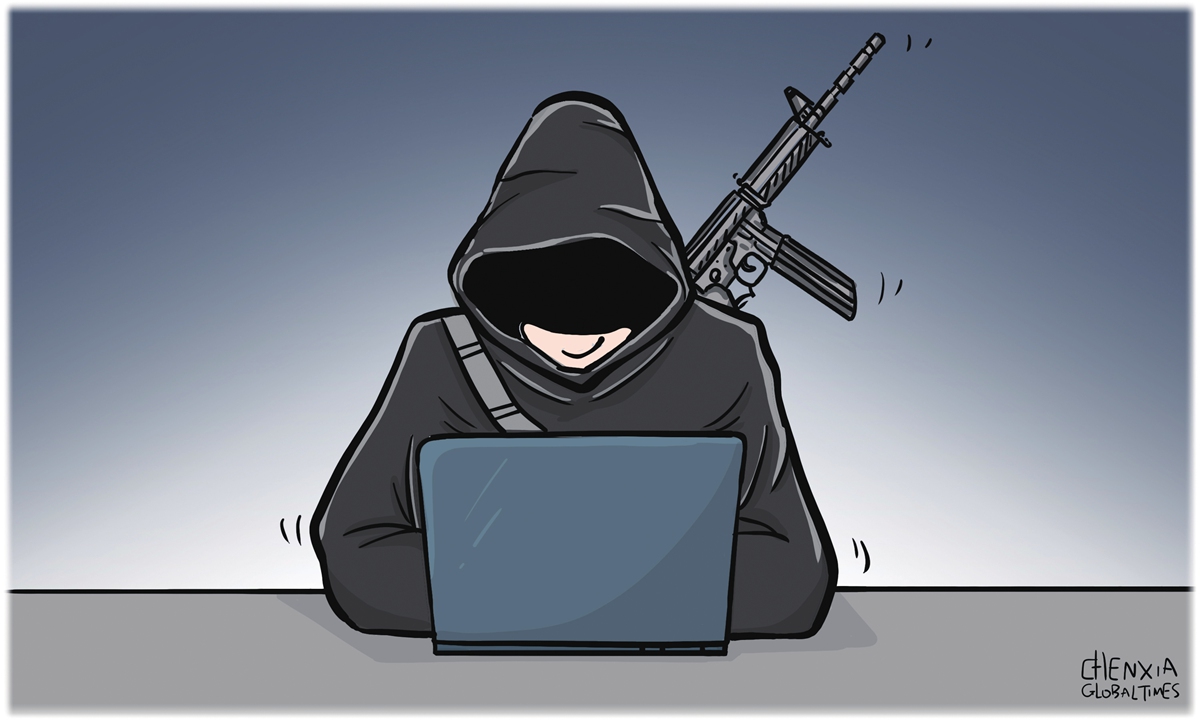
Hacker. Illustration: Chen Xia/GT
Click here to stay tuned with our live updates on Ukraine tensions.
Cyberwarfare has gained widespread attention as a new form of modern warfare. Russia, as a recognized cyber power, has prevailed in cyber conflicts with Georgia, Estonia, and other countries. In the recent Russia-Ukraine conflicts, intense conflicts took place in cyberspace even before the "hot war" began.
A buzzword though, cyberwarfare is defined quite differently between cautious scholars and the public. Official statements on conflicts in cyberspace have been so far extremely restrained, with few references to the term "cyberwarfare." Official US government documents have used "offensive and defensive cyber operations" instead of "cyberwarfare." The ultimate reason is the lack of real cases of cyberwarfare and empirical case studies. The conflict between Russia and Ukraine provides us with a valuable case study for a closer look at cyberwarfare, and sheds new light on this area.
On the one hand, traditionally, cyberwarfare cannot exist independently of hot wars. During the Ukraine crisis, cyber-attacks targeted defense networks and critical information infrastructure, while conventional kinetic weapons such as tanks, aircraft and artillery remained the mainstay of the battlefield.
If cyberwarfare is to be recognized, cyber weapons would have to play a more significant role. The understanding of cyberwarfare would change profoundly if cyber weapons were capable of directly paralyzing an opponent's military command and control system, causing them to surrender without resistance. For now, we still need to remain careful about cyberwarfare.
On the other hand, cyberwarfare with regard to cognition on social media has emerged, fighting for a greater say about the legitimacy of the conflict and for the right to interpret its course. It's hard to say which one is more destructive, the cyberwarfare or the real conflict. Russian scholars made it clear at a recent international seminar on cyber conflict, that the hatred against Russia on social media incited by the West is a crucial cause of the confrontation, and even caused the fierce conflict, between Russia and Ukraine.
In addition, the intensity of this cyberwarfare is no less than that of the real conflict offline. It can be said that the Russia-Ukraine conflict is the most reported in history, with major social media platforms sharing information, which gives us a panoramic view of the conflict. But at the same time, it is easy to be influenced by second-hand information.
The "truth" about the war depends on the resources invested and the power to make the rules. Western social media, in general, began to fire at Russia, with more official Russian media outlets being blocked, and Meta and Twitter focusing on increased censorship of Russian posts. Obviously, the West is using social media to fight for the voice in the conflict and the right to interpret it.
Another aspect of the cyber conflicts is the change in the parties involved, especially the emerging non-state actors, such as the hacker collective "Anonymous" that has declared cyberwar on Russia, and social media users from various countries who actively campaign for the conflicts. They are all making the conflicts more complex and difficult to control.
Direct communication between governments involved in the Cuban Missile Crisis once played a key role in the resolution without being impacted by non-state actors. In the Ukraine crisis, however, social media has made the arena of public opinion more complicated, leading the governments to bear the ultimate responsibility to end the conflicts but without a voice. All kinds of disinformation and misinformation from various forces affect both the public's judgment and the government's decision-making.
Finally, it is worth observing whether the US will assist Ukraine in its cyber defense or even help launch a cyberattack against Russia, which is under serious discussion within the US. Direct involvement from the US Cyber Command in the conflicts will indeed
However, the US also faces difficult decisions. Is cyber participation in a conflict the same as actual participation? There is probably no consensus on this, and what Russia will do in retaliation will depend on its perception. After all, the US once claimed that it would consider nuclear retaliation in the case of significant non-nuclear strategic attacks, including attacks on infrastructure.
The author is a researcher and secretary general of the Research Center for International Cyberspace Governance under the Shanghai Institute for International Studies. opinion@globaltimes.com.cn



